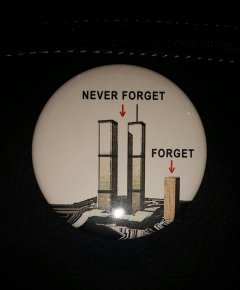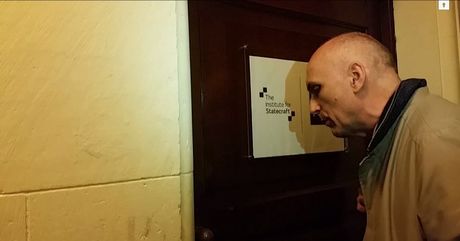Difference between revisions of "Memory hole"
| (3 intermediate revisions by one other user not shown) | |||
| Line 3: | Line 3: | ||
|founders=George Orwell | |founders=George Orwell | ||
|image=911_forget_never_forget.jpg | |image=911_forget_never_forget.jpg | ||
| − | }} | + | |constitutes=statecraft, Orwellian language |
| − | A '''Memory hole''' is a method of destroying documents that [[George Orwell]] famously described in ''[[Nineteen Eighty-Four|1984]]''. Metaphorically, it refers to censorship or amnesia of unwanted information, especially as a result of an intention to deny the past in order to lie about it. | + | |description=Mentioned in [[Nineteen Eighty-Four]] as a tool of [[censorship]], now used metaphorically to describe the fate of unpalatable truths. |
| + | }}A '''Memory hole''' is a method of destroying documents that [[George Orwell]] famously described in ''[[Nineteen Eighty-Four|1984]]''. Metaphorically, it refers to censorship or amnesia of unwanted information, especially as a result of an intention to deny the past in order to lie about it. | ||
==Usage== | ==Usage== | ||
| Line 14: | Line 15: | ||
* 1945-? : [[Operation Gladio]] - A campaign of [[false flag]] [[bombings]], [[murders]], [[assassination]]s by [[NATO]]. Only low level operatives prosecuted. | * 1945-? : [[Operation Gladio]] - A campaign of [[false flag]] [[bombings]], [[murders]], [[assassination]]s by [[NATO]]. Only low level operatives prosecuted. | ||
* 1972-74 : [[Watergate coup]] - Not a random scandal, but a defensive coup by [[The Cabal]] to unseat [[Nixon]] | * 1972-74 : [[Watergate coup]] - Not a random scandal, but a defensive coup by [[The Cabal]] to unseat [[Nixon]] | ||
| − | * 1975 : [[The Australian coup d'etat]] - Another regime change | + | * 1975 : [[The Australian coup d'etat]] - Another regime change operation |
| − | * 1981 : [[Arms For Libya]] - "The biggest arms-dealing case in U.S. history" | + | * 1981 : [[Arms For Libya]] - "The biggest arms-dealing case in U.S. history" - As of 2020, mentioned on [[Wikipedia]] but not got its own page |
==21st Century== | ==21st Century== | ||
[[image:Chris Williamson Institute for Statecraft door slam.jpg|right|thumbnail|460px|[[Chris Williamson]] MP on 19 December 2018, after [[Dan Lafayeedney]] slammed the door to the [[Institute for Statecraft]] in his face.]] | [[image:Chris Williamson Institute for Statecraft door slam.jpg|right|thumbnail|460px|[[Chris Williamson]] MP on 19 December 2018, after [[Dan Lafayeedney]] slammed the door to the [[Institute for Statecraft]] in his face.]] | ||
| + | |||
| + | ===[[2001]]=== | ||
| + | *[[2001 Mexican legislative assembly attack]] | ||
| + | *[[American Airlines Flight 587]] | ||
| + | |||
| + | |||
[[Computers]] enables perfect recall of past data, leading to the saying that the "internet never forgets",<ref>https://www.independent.co.uk/student/istudents/the-internet-never-forgets-so-be-careful-what-you-put-on-it-8787706.html</ref>. Moreover, since the [[internet]] (and especially the [[world wide web]]) allow instantaneous moving of documents globally, the realisation of an effective memory hole is nowadays very difficult (and risks the [[Streisand effect]]). | [[Computers]] enables perfect recall of past data, leading to the saying that the "internet never forgets",<ref>https://www.independent.co.uk/student/istudents/the-internet-never-forgets-so-be-careful-what-you-put-on-it-8787706.html</ref>. Moreover, since the [[internet]] (and especially the [[world wide web]]) allow instantaneous moving of documents globally, the realisation of an effective memory hole is nowadays very difficult (and risks the [[Streisand effect]]). | ||
Latest revision as of 21:24, 17 August 2021
(statecraft, Orwellian language) | |
|---|---|
 | |
| Founder(s) | George Orwell |
| Mentioned in Nineteen Eighty-Four as a tool of censorship, now used metaphorically to describe the fate of unpalatable truths. | |
A Memory hole is a method of destroying documents that George Orwell famously described in 1984. Metaphorically, it refers to censorship or amnesia of unwanted information, especially as a result of an intention to deny the past in order to lie about it.
Contents
Usage
The phrase is often used with the preposition "down", so that documents, ideas or facts are said to vanish/slip/disappear "down the memory hole" when they are censorsed. For example, Harry Truman's call to check the CIA's powers, Osama bin Laden's denial of culpability for 9-11 or Jimmy Carter's statement that "America does not at the moment [in 2013] have a functioning democracy."[1]
20th Century
The 20th century commercially-controlled media was a few to many broadcast medium, as such well suited to the implementation of memory holes. This website details dozens of 20th century events which have fallen to some extent down the memory hole, particularly those perpetrated by the US deep state, such as:
- 1933 : The Business Plot - A failed fascist coup in USA by the Money Trust. No one prosecuted, senior names kept off the record
- 1945-? : Operation Gladio - A campaign of false flag bombings, murders, assassinations by NATO. Only low level operatives prosecuted.
- 1972-74 : Watergate coup - Not a random scandal, but a defensive coup by The Cabal to unseat Nixon
- 1975 : The Australian coup d'etat - Another regime change operation
- 1981 : Arms For Libya - "The biggest arms-dealing case in U.S. history" - As of 2020, mentioned on Wikipedia but not got its own page
21st Century

2001
Computers enables perfect recall of past data, leading to the saying that the "internet never forgets",[2]. Moreover, since the internet (and especially the world wide web) allow instantaneous moving of documents globally, the realisation of an effective memory hole is nowadays very difficult (and risks the Streisand effect).
This website is an effort to counter the memory hole phenomenon, to compile information and in so doing to expose deceptions past and present. The Memory Hole Blog is similarly inspired.
An example
| Page name | Description |
|---|---|
| 9-11/Insider Trading | A mound of evidence points to insider trading. However, the 9/11 Commission decided not to investigate the matter and the SEC destroyed important records. |
Related Quotation
| Page | Quote | Author | Date |
|---|---|---|---|
| Search engine | “When trying to triangulate truth these days, it is often useful to employ multiple different search engines.” | Robert Malone | 28 January 2023 |